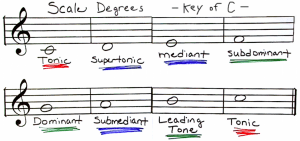School or Rock – Day 3 – Melody Basics
SUMMARY
Write your daily summary last, at the end of the day here… Only one to two sentences.
CLASSROOM
Watch How Melody Works (47 minutes)
Some melodic principles are universal. The pentatonic scale is in human dna. What you do with your notes is more important than how many you have. Music, notes, and how you speak are all highly cultural.
LAB
Watch the tutorial and write the melody to twinkle twinkle.
I learned that I’m still not very good at reading sheet music, and that learning new buttons and systems and stuff is pretty hard. I like that hookpad is color coded. I think I should probably explore more before trying to just stick a song in there.
OUTSIDE / JOURNAL / IDEAS
Don’t listen to people when they say “aren’t you afraid…” Even if you are afraid, don’t let them fuel their fears. Just do your part, the world isn’t resting on your shoulders.
STUDIO
- By Jamie Henke, music.wisc.edu/faculty/jamie-henke/
Melody Composition Terms
- Theme – A longer, more flowing melodic idea
- Motive –
- Period – Musical sentence/ 8 measures
- Phrase – 4 measures/ half of a period
- Antecedent (Question) Phrase – The first phrase/ the question
- Consequent (Answer) Phrase – The consequent/answer phrase
- Scale Degrees
- Tonic – The beginning and end of a scale, defines what key you’re in
- Supertonic, Mediant, Submediant –
- Dominant, Subdominant, Leading Tone – the degrees that create the most tension
- Steps – any movement using
- Leaps –
- Conjunct motion – melody built primarily using steps
- Disjunct motion – melody built primarily using leaps
- Repetition – use repeated material to create a link between
- Contrast – write two phrases
- Variation – half way between repetition and contrast
Melody Resources


Mr. Le Duc’s Key of C Major Notes and Chords Chart (PDF)
CONTROL ROOM
Learn how to Create Tracks
Explore the Piano Roll, Drawing and Moving Notes
Learn to Edit Notes, Velocity, and More
Learn to Create Your Own Presets
- Write a brief reflection on how this process worked for you.
WHAT I LEARNED and PROBLEMS I SOLVED
Tell your daily story here! Highlight what you learned and enjoyed most. Problem-solving is one of the most important skills you need in life. Employers want to know HOW you get stuff done as much as WHAT you got done.